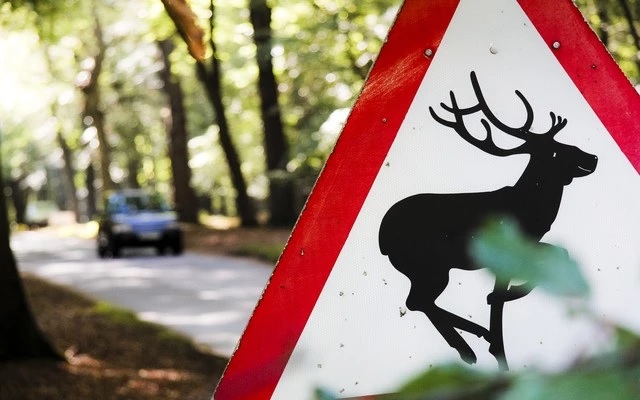From pet cats wandering the streets to deer crossing country lanes, the risk of hitting an animal is a daily concern for drivers.
If you're unfortunate enough to have a collision with an animal, do you know what to do? And if your car is damaged as a result, can you claim on your insurance?

Being animal aware
First, get familiar with your road signs so you know when you could be sharing the road with deer, otters or even toads.
If you see a warning sign for animals, check your speed to allow plenty of time to slow safely in case one springs out of nowhere.
And take especial care if you're driving along these roads in poor visibility – either at night or during foggy weather.
If it's wet or icy weather on an ungritted country road, your stopping distances will be greater.
Should I emergency stop for an animal?
Swerving to avoid a small animal may seem like the compassionate thing to do, but you could be putting other people in danger.
Sudden manoeuvres or braking could lead to an accident with another motorist, and the accident will be your responsibililty.
If you can be sure there's no one else on the road, behind you or coming your way, then make some space for the crossing toad or small wildlife.
If the animal is much bigger – say a pony or a deer – you'll need to avoid a collision. Keeping a slower speed should give you enough time to react without putting yourself or others in danger.
What's the law about hitting an animal?
The most important thing to consider after hitting an animal is your own safety, and the safety of other road users. After an accident, find a safe place to pull over and check if any passengers are hurt. Then see if your car is damaged. Once done, you should check on the animal.
If possible and it's safe to do so, move the animal off the road. If it's injured, the RSPCA will be able to give you advice.
You may also need to phone the police. Under the Road Traffic Act 1988 you have a legal responsibility to inform the police if you hit a:
- Dog
- Horse
- Cow or other type of cattle
- Pig
- Goat
- Sheep
- Donkey or mule
Once you've reported the incident, follow the advice of the police. They may need you to remain at the scene long enough to collect details for the animal's owner. Once you're allowed to leave, you don't have any further legal obligations.
The local council has responsibility to remove any wild animals from the road, so report the location of the animal as soon as you can. You can also report any dead animal you come across – even if you didn't hit it yourself. It's not a legal obligation but it does help keep the roads safer.
Deer accidents
Some parts of the country are prone to deer crossing roads, especially where there is woodland or forestry. Check our top tips for avoiding deer collisions
What if I hit someone's pet?
As far as the law's concerned, you must report hitting a dog. If you do run over a dog, see if it's wearing an ID collar and get in touch with the police as soon as possible.
At present you don't have to report hitting a cat, though the owner will appreciate it if you check for a collar and contact them.
If the cat is injured, you could wrap it up in any blankets you have and take it to a vet. Be cautious around any wounded animal – they could get aggressive if in pain.
Am I covered if I have a collision with an animal?
Hitting a large animal at any speed can cause extensive damage – to both the car and the animal.
Most comprehensive policies will cover damage to your vehicle that wasn't the result of a crash with another car.
If you make a claim after colliding with a wild animal you're likely to lose your no claims discount, unless you have protected no claims discount in place. And you'll have to pay the excess too.
If you can prove the animal was a pet, farm animal or any animal otherwise owned, you can reclaim your costs through the owner whereby they should have kept the animal secure.
Other types of animal damage
Squirrels, mice and other rodents can sneak into your car and chew on the wiring inside. If you have comprehensive insurance repairs are usually covered. But you may be asked to prove that your car was parked somewhere secure. You may not be able to make a claim if your car is in storage or parked on the street, for example.
Keeping alert and animal aware should prevent accidents with animals, but if you're unfortunate enough to hit one you can be sure that our Defaqto Star rated car insurance will always be there to help.
Author: The AA. Published 24 April 2019. Updated 18 December 2024.
